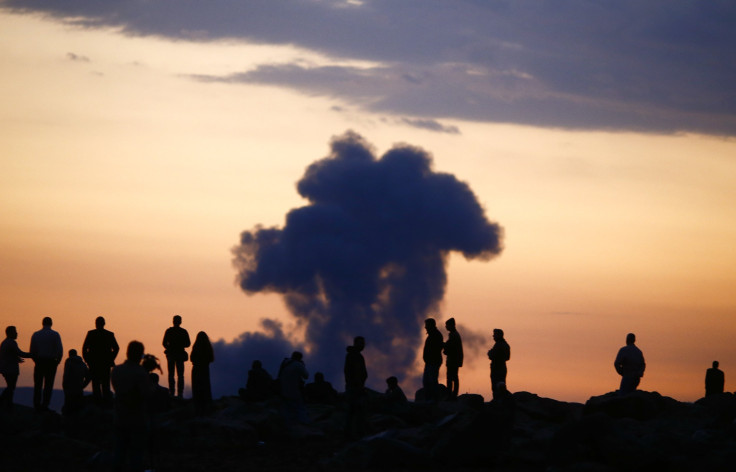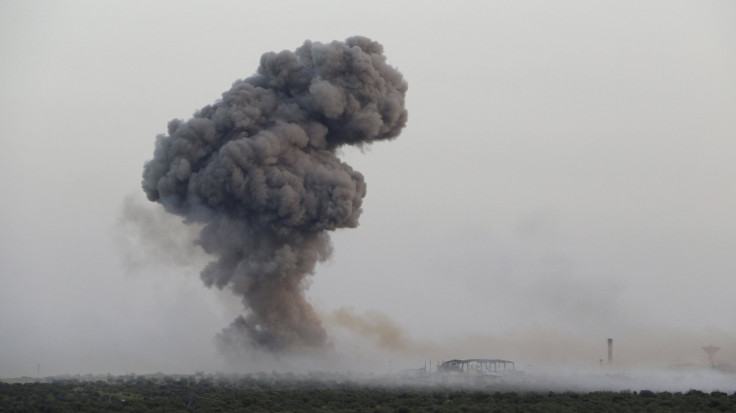War Against ISIS: Why Turkey-US Buffer Zone In Syria Won't End Long, Complicated Battle Against Islamic State Group

The announcement this week of a "safe zone" along Syria's northern border with Turkey highlights the next step in the protracted U.S. campaign to defeat the Islamic State group. In the next few weeks, the buffer zone is expected to drive the Islamic State group -- also called ISIS or ISIL -- away from Turkey's border and cut off crucial supply routes through Turkey, as well as create a safe space for both refugees and Syrian opposition fighters.
But the long-term impact of a buffer zone is yet unknown, and analysts said it was unlikely to immediately slow the spread of the militants, who now control large swaths of Syria and Iraq and have gained supporters in North Africa and across the Middle East. Some worry the safe zone could have the adverse effect of bolstering al Qaeda in the region or pushing ISIS to establish strongholds elsewhere in war-torn Syria.
'Not A Game-Changer'
"This is not a game-changer," said James Jeffrey, former U.S. ambassador to Iraq (2010 to 2012) and a fellow at the Washington Institute for Near East Policy, a Washington think tank. "It's not going to defeat ISIS, but it will make it harder for ISIS to operate."
The safe zone is expected to be established along the 90 miles of the border currently under control of the militant group northeast of Aleppo, Syria, effectively shutting off ISIS from Turkish territory. It remained unclear Monday how deeply the zone would penetrate into Syria. Turkey's porous border with Syria stretches nearly 600 miles, but much of that territory is controlled by Kurdish forces opposed to ISIS.
The zone will be established with the support of American and Turkish air power, but will ultimately be maintained by Sunni rebels who are deemed allies on the ground, officials said this week. The buffer zone was announced as Turkey, long reluctant to intervene in Syria, stepped up its offensive against ISIS militant following a
We look forward to intensifying cooperation with Turkey and all of our partners in the global fight against #ISIL. 5/5 #ISIS #Daesh
— Brett McGurk (@brett_mcgurk) July 25, 2015"It seems like a step in the right direction if it signals that Turkey is becoming more involved in this fight," Christopher Preble, vice president for defense and foreign policy studies at the Cato Institute, said. "There's pretty significant limits of what the U.S. can do [alone] in Iraq and Syria and the border regions of Turkey."
'A Dozen-Sided Battle'
But establishing a safe zone will be far from simple and could carry significant long-term implications in a civil war that has grown increasingly complex and multifaceted, security experts said. By stepping up support for rebel groups working to defeat Syrian President Bashar Assad, the U.S. and Turkey are bound to anger the embattled Syrian regime, which could make it more difficult to operate military campaigns in Syria. In the last year, the U.S. has largely focused its campaign on defeating ISIS, ignoring calls by rebel groups for support in ousting Assad.
The Syrian regime is likely to view the buffer zone as a hindrance to its fight against rebel forces. While neither the U.S. nor Turkey are saying the plans will involve a no-fly zone, which would require that the air space be used only by coalition forces, experts said the move was likely to effectively operate like one, as Assad's forces were likely to find it difficult to use contested airspace for staging operations against ISIS and other rebel groups in the country's north.
There also remained concern that support for rebels could play into the hands of al Qaeda in the region. Jabhat al-Nusra, which the U.S. considers a terrorist organization, has agreements in the Aleppo district with other rebel groups. Jennifer Cafarella, an analyst on the Institute for the Study of War's Syria team, said policy for pinpointing allies on the ground will have to be a "very nuanced" one, as the sides fighting the civil war have grown increasingly blurred.

If ISIS is pushed from the border region, Cafarella said there were fears the group could permeate deeper into areas currently held by opposing rebel forces or Assad's regime in the Aleppo province. In that event, the air campaign, which would have to focus in on urban areas, could prove more difficult to fight.
The difficulties likely to be experienced in establishing a buffer zone reflect just how complicated and blurry the lines have grown in a war that has already displaced millions.
"This is not a two-sided battle, this is at least a three-sided battle, and likely a dozen-sided battle," Prebele, of the Cato Institute, said.
© Copyright IBTimes 2024. All rights reserved.






















